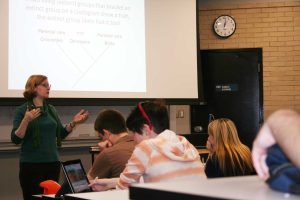Senate Bill 83 could sever academic ties to China
April 4, 2023
A group of Ohio lawmakers have introduced a new bill that would ban Ohio universities like BGSU from having an “academic relationship” with academic institutions in China.
Senate Bill 83, introduced on March 14 by State Senator Jerry Cirino, would prohibit funding for research collaborations between Ohio university researchers and those at academic institutions in China, as well as study abroad programs.
The bill proposes sweeping changes to higher education in Ohio, including prohibiting strikes among public employees and dismantling mandatory programs and training related to diversity, equity and inclusion.
Senate Bill 83 would mandate that “no state institution of higher education shall enter into any academic relationship with an academic institution located in China or an academic institution that is located in another country and is associated with the People’s Republic of China.”
Additionally, Ohio universities would not be able to accept gifts, donations or contributions from China.
Louisa Ha, the coordinator of BGSU’s School of Media and Communications’ graduate programs, said she believes Senate Bill 83 would increase hostility against Chinese people and make students reconsider coming to Ohio colleges and universities.
“Now that the environment is more and more hostile, fewer and fewer people would want to stay here, or they won’t tell people,” Ha said. “They won’t encourage people to apply here.”
Ha said BGSU currently has a good reputation in China in terms of the interaction between Chinese students and faculty.
“But with this kind of policy and this kind of environment, they would tell other people not to come,” Ha said.
Next to university recruitment initiatives, word of mouth brings many international students to BGSU. Currently, Chinese international students make up more than 5% of international student enrollment, according to BGSU’s International Programs and Partnerships.
Falcon Media reached out to BGSU’s International Programs and Partnerships office but they declined to comment on Senate Bill 83.
Still, BGSU faculty like Ha say their research will suffer should Senate Bill 83 pass.
Ha wrote a book that was published last year titled “The U.S.-China Trade War: Global News Framing and Public Opinion in the Digital Age (U.S.-China Relations in the Age of Globalization).”
While Ha does not get money from the U.S. to do this sort of research, the book, which includes research on public opinion on China and the U.S., was funded by a grant from China.
“If they have this kind of policy, I would not be able to collaborate with China,” Ha said. “It would really affect my academic career in terms of how I can do things.”
If it passes, Ha said she would consider retiring early and leaving because she doesn’t feel safe.
“I don’t feel secure now, especially now with this bill, I really think that it may make me want to think [about] retiring sooner or move later,” Ha said. “If they really pass this bill, I’m going to leave sooner because it’s not a safe place for me. I don’t want to be accused of whatever, which I’m not.”
Ha believes lawmakers are seeing the academic exchange with China as a political maneuver of political spying.
During an interview with Falcon Media, Ha held up her book, and said, “This is published. It is published scientific research. It is not proprietary, it’s not spying. Spying is something that you don’t tell people and then you secretly send some information to people for secret. You don’t share. But we share,” Ha said.
Ha encourages lawmakers to eliminate political rhetoric and consider people’s welfare.
“Right now, the rhetoric is really, really bad and I want people to be more rational on those things by looking at data,” Ha said.
“I’m an American citizen. I want America to be strong, but what they are doing is the wrong direction, wrong decisions that would lead to disaster as a result for America,” Ha said.
But proponents of Senate Bill 83, including the primary sponsor of the bill, Republican Sen. Jerry C. Cirino, said the Ohio Higher Education Enhancement Act is “all about the students.”
“Ohio’s economic future requires that we graduate students who have been taught how [emphasis added] to think, not what [emphasis added] to think,” Cirino said during his testimony at the bill’s first Senate committee hearing. “They need to be trained [in] how to analyze problems and evaluate policies by looking at all sides of the issue.”
During his testimony, Cirino said, “All of the issues dealt within this bill relate to delivering quality.”
The Workforce and Higher Education Committee will hold its next hearing on the bill on March 29.
Falcon Media reached out to Assistant Vice President of Marketing and Brand Strategy Amy West for comment on BGSU’s response to Senate Bill 83, but we have not received a response.

















